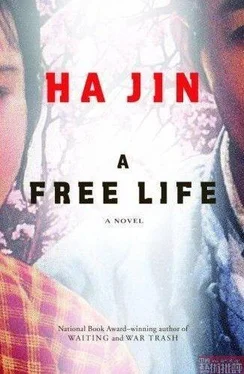Pingping was relieved that he hadn't promised his mother anything. She not only disliked the old woman but also was frightened of her. Every once in a while she'd have nightmares in which her mother-in-law jabbed her fingers at her face, sneering or calling her names. From the first days of their marriage she had wanted to live as far away as possible from Old Yulan, Nan 's mother, yet Pingping could never break off with her completely, no matter where she was. Whenever she opened a letter from her, she couldn't help but shudder a little, and she often heard her abrasive voice at night. If only she could banish that old woman from her mind altogether. On the other hand, she liked her father-in-law and felt grateful to him because the old man had often carried Taotao astride his neck and allowed the boy to play in his large office. Once Taotao squeezed his grandfather's toothpaste all over his desk and sofas, but the old man didn't throw a fit and just made him promise not to do it again. So the five hundred dollars Nan had given his father didn't bother her, and even the money for an air conditioner for Uncle Zhao was well spent, having cleared the debt they had owed him.
With more devotion Nan resumed working at the Gold Wok, and the long hours didn't bother him as much as before. He was grateful to Pingping, who had over the years spent more time at the restaurant than himself. For better or worse, this place was their own, and with it they could make an honest, decent living. But a few weeks later Nan grew restless again, scribbling poems whenever he had free time. A new concern began to trouble him as well. By now they had saved almost $30,000, and the money, sitting in the bank, would hardly accrue. Should they buy another restaurant? He and Ping-ping talked about this but couldn't decide what to do, because a new business would mean they'd have to hire some people, whose wages would consume most, if not all, of the profit.
Then Janet suggested that Pingping consider buying some stocks. She loaned her a few issues of Money magazine. Through reading them Pingping began to understand what mutual funds were. Janet also told the Wus that Dave's retirement money had been invested entirely in mutual funds, so Nan and Pingping were convinced that it wouldn't be too risky to buy the stocks. They bought $20,000 worth of 500 Index. From then on Pingping would pay close attention to the Dow Jones, but Nan didn't bother to think about money. He was occupied with work and some poetry books.
Recently he had fallen in love with a volume of poems, The Lost Geography, by Linda Dewit, who lived in Vermont according to the biographical note on the back of the book. He liked her dark lyricism, which reminded him of Kent Philips's paintings. How strange this coincidence was. That man painted landscapes in Montana, whereas the old poet wrote about people and things in New England, but their works seemed to have some kindred spirit. Perhaps the dark luminosity had stemmed not from without but from within, from the depths of their souls. Nan also believed that the beauty of Dewit's poetry might be due to the always present awareness of mortality in the speaker's mind, even when she celebrated nature and life. Her lines were elegant, supple, honest, and always intelligent, for example, "Imagine, in a northern dusk / even a breeze brings you extra light," and "I hate the erosion of your affection / and will stop wearing smiles." Nan was fascinated and pored over Linda Dewit's poems whenever he was free. He even hand-copied the pieces he liked most.
One day he was surprised to receive a letter from Bao Yuan. His friend had written on the inside of a card bearing a pair of swans in rippling water:
August 26, 1997
Dear Nan,
By the time you read this letter I'm already on my way back to China. Life in America is too difficult for me, and I am reluctant to have my wife live here. She is the youngest child of her family and might not be able to endure the loneliness or survive the struggle we would have to wage if I stayed. Besides, her parents wouldn't let her live far away from home. Also, they are obssessed with their granddaughter, my baby girl. Now that I am a U.S. citizen, I can travel back and forth, so I made up my mind to settle down in our homeland. I'm sure I will miss the Blue Ridge Mountains, but I plan to stay and work on the mountain for three or four months a year. That's to say, from now on I will live as a world citizen. When I come back, I'll let you know beforehand. Meanwhile, may your business and writing both flourish.
As ever,
Bao
To Nan, Bao had been a remarkable success, so the letter threw him deep into thought. What had made Bao retreat to China? Hadn't he already bought a building lot for his future home in Cobb County? Why had he changed his plan all of a sudden? He seemed to have given up too easily. Clever, that man was too clever.
Nan couldn't picture Bao's actual situation, but he was sure that the reasons his friend mentioned in the letter might not be the real ones. He suspected that Bao must have suffered a setback in his art. Perhaps his agent, Ian Bernstein, had lost interest and confidence in him after the debacle of Bao's Shanghai series. In retrospect, Nan could see that this had been bound to happen, since Bao rushed too much and fell prey to moneygrubbing instead of aspiring to a higher order of artistic achievement. Even in this capitalist land a true artist ought to spurn the temptation of money. Indeed, China was probably more suitable for a man like Bao. Nan thought of writing back, but his friend had given no return address. Bao must have left in a hurry.
Later Nan heard that Frank, the lawyer, had sold the piece of land on which Bao's studio sat to a developer, which all of a sudden rendered his teacher homeless in this country.
ONCE in a while Nan would call Dick using phone cards he had bought at the World Bookstore; calls within the United States were only three cents a minute, and they didn't show up on the phone bill, so Pingping couldn't complain or suspect that Dick might mislead Nan into something shady or even take him away from her. In the fall Dick invited Nan to visit him, saying that if Nan liked the Iowa Writers' Workshop, he would try to get a scholarship for him, provided Nan worked hard on his poetry and came up with some strong writing samples with which Dick could convince his colleagues of his talent. Despite his distrust of such workshops, Nan was intrigued and eager to see his friend. Pingping wasn't happy about the idea and said to him, "You just came back from China two months ago. You can't leave this place to me again."
"Only this once, please. I won't do it again, I promise."
"No."
"Please let me go and see what the writers' workshop is like." "I've said no."
That topic came up every day, and a week later Pingping caved. They asked Shubo to stand in for Nan and he agreed readily. Shubo was unemployed again because the marble quarry had shut down. Mr. Mu, the backup chef, had left for Alabama to work for his nephew who had just opened a restaurant in Mobile. Though Shubo couldn't cook as well as Nan, Pingping could give him a hand in the kitchen if need be. Nan promised his wife he would be away for just five days at most.
There was another motivation he hadn't revealed to Pingping, namely that he planned to visit Beina on this trip. He knew this was crazy and that the woman might not be pleased to see him, but he couldn't help himself, as if a supernatural force possessed him, driving him toward her. To his mind, even if she wasn't happy about his reappearance, the sight of his first love in this land might rekindle the intense passion he needed for writing poetry, for which he wouldn't mind exposing himself to new wounds.
He knew he was acting like a reckless, love-crazed youth, but despite his uneasiness, he couldn't wait to see her-as if his sanity depended on such a meeting. He was going to drive the hatchback he had bought secondhand the previous winter after his old Ford's clutch had gone. This reliable Dodge should make the trip enjoyable and less tiring.
Читать дальше












